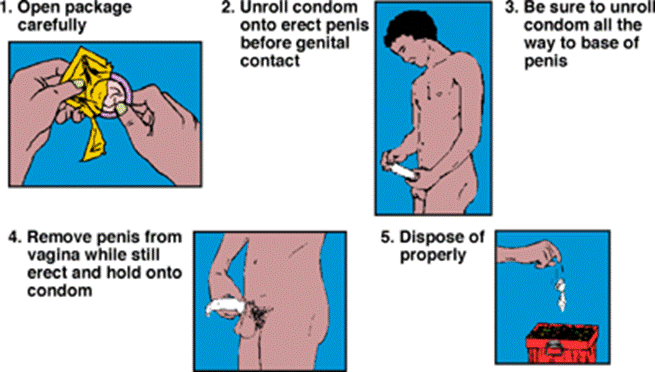While obtaining a health history from a male adolescent during a good check-up, the nurse assesses his sexual behavior and risk for sexually transmitted infections. Based on the information, the nurse plans to teach the adolescent about using a condom. What statement would the nurse include in the teaching plan?
"Store your condoms in your wallet so they are ready for use."
"Use petroleum jelly with a latex condom for extra lubrication."
"Put the condom on before engaging in any genital contact."
"You can reuse a condom if it's within 3 hours."
The Correct Answer is C
Choice A: "Store your condoms in your wallet so they are ready for use." This statement is not correct and should not be included in the teaching plan. Storing condoms in a wallet can damage them by exposing them to heat, friction, or puncture. Damaged condoms can break or leak during sexual activity and increase the risk of STIs or pregnancy.
Choice B: "Use petroleum jelly with a latex condom for extra lubrication." This statement is not correct and should not be included in the teaching plan. Using petroleum jelly or any oil-based lubricant with a latex condom can weaken the latex material and cause it to break or slip off. Only water-based or silicone-based lubricants should be used with latex condoms.
Choice C: "Put the condom on before engaging in any genital contact." This statement is correct and should be included in the teaching plan. Putting the condom on before engaging in any genital contact can prevent the transmission of STIs or pregnancy by avoiding contact with pre-ejaculate fluid, semen, or vaginal fluid.
Choice D: "You can reuse a condom if it's within 3 hours." This statement is not correct and should not be included in the teaching plan. Reusing a condom can increase the risk of STIs or pregnancy by exposing the partner to residual fluid, bacteria, or sperm. A new condom should be used for each sexual act.

Nursing Test Bank
Naxlex Comprehensive Predictor Exams
Related Questions
Correct Answer is C
Explanation
Choice A: "Store your condoms in your wallet so they are ready for use." This statement is not correct and should not be included in the teaching plan. Storing condoms in a wallet can damage them by exposing them to heat, friction, or puncture. Damaged condoms can break or leak during sexual activity and increase the risk of STIs or pregnancy.
Choice B: "Use petroleum jelly with a latex condom for extra lubrication." This statement is not correct and should not be included in the teaching plan. Using petroleum jelly or any oil-based lubricant with a latex condom can weaken the latex material and cause it to break or slip off. Only water-based or silicone-based lubricants should be used with latex condoms.
Choice C: "Put the condom on before engaging in any genital contact." This statement is correct and should be included in the teaching plan. Putting the condom on before engaging in any genital contact can prevent the transmission of STIs or pregnancy by avoiding contact with pre-ejaculate fluid, semen, or vaginal fluid.
Choice D: "You can reuse a condom if it's within 3 hours." This statement is not correct and should not be included in the teaching plan. Reusing a condom can increase the risk of STIs or pregnancy by exposing the partner to residual fluid, bacteria, or sperm. A new condom should be used for each sexual act.

Correct Answer is B
Explanation
Choice A: "Don't worry, I will be with you during the exam." This response is not appropriate because it does not address the client's feelings or concerns. It also may sound dismissive or patronizing to the client, who may have valid reasons to be nervous.
Choice B: "What part of the exam makes you most nervous?" This response is appropriate because it shows empathy and interest in the client's perspective. It also invites the client to express her fears or questions and allows the nurse to provide information and reassurance.
Choice C: "All you need to do is relax." This response is not appropriate because it does not acknowledge the client's feelings or concerns. It also may sound unrealistic or insensitive to the client, who may find it hard to relax in a stressful situation.
Choice D: "A pelvic exam is required if you want birth control pills." This response is not appropriate because it does not address the client's feelings or concerns. It also may sound coercive or threatening to the client, who may feel pressured or intimidated by the requirement.
Whether you are a student looking to ace your exams or a practicing nurse seeking to enhance your expertise , our nursing education contents will empower you with the confidence and competence to make a difference in the lives of patients and become a respected leader in the healthcare field.
Visit Naxlex, invest in your future and unlock endless possibilities with our unparalleled nursing education contents today
Report Wrong Answer on the Current Question
Do you disagree with the answer? If yes, what is your expected answer? Explain.
Kindly be descriptive with the issue you are facing.
